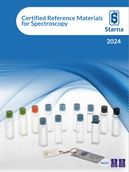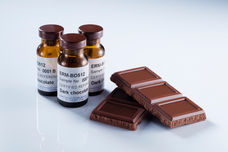LGC rebrands reference standards
Mikromol range of reference substances and custom synthesis services join LGC brand of quality standards
LGC has announced its migration of the Mikromol brand, most notably the range of pharmaceutical impurity reference standards, to its own brand at the 2005 Eastern Analytical Symposium (EAS), Somerset, New Jersey, USA, 14-17 November.
The pharmaceutical industry is required to control impurities, or the 'unwanted' chemicals, in its formulations. Since its acquisition of the German company Mikromol in 2003, LGC, the UK's designated national measurement institute (NMI) for chemistry and biochemistry, has continued to develop pharmaceutical impurity reference standards with its colleagues in Luckenwalde near Berlin.
Dr Derek Craston, Head of LGC's Pharmaceutical and Chemical Services division, said: "Under the management of Dr Günter Funk and Dr Hans Zimmermann, the Mikromol brand has established an excellent reputation in the market for the synthesis of pharmaceutical impurities. The decision to transfer the brand to LGC is a reflection of the progressive quality of the product, such that the stringent standards associated with a national measurement laboratory will soon be achievable. I am delighted by the changes in quality systems being instituted at Luckenwalde and by the move of our dedicated scientific team towards higher accreditation."
A new laboratory and production facility for pharmaceutical impurities to support the capability of LGC's German operation in Luckenwalde is planned for opening in Bangalore, India, where LGC Promochem India Private Ltd is based.
Most read news
Other news from the department business & finance
These products might interest you

Certified Reference Materials for Spectroscopy by Starna Scientific
Starna Scientific: Your solution for precise spectroscopy calibration
ISO-certified reference materials for accurate and safe spectroscopy

Certified reference materials of the European Commission's Joint Research Centre by ERM
Certified reference materials for the analysis of environmental,food,clinical and industrial samples
Certified reference materials (CRMs) provide confidence in the correctness of analytical results

Get the chemical industry in your inbox
By submitting this form you agree that LUMITOS AG will send you the newsletter(s) selected above by email. Your data will not be passed on to third parties. Your data will be stored and processed in accordance with our data protection regulations. LUMITOS may contact you by email for the purpose of advertising or market and opinion surveys. You can revoke your consent at any time without giving reasons to LUMITOS AG, Ernst-Augustin-Str. 2, 12489 Berlin, Germany or by e-mail at revoke@lumitos.com with effect for the future. In addition, each email contains a link to unsubscribe from the corresponding newsletter.
Most read news
More news from our other portals
See the theme worlds for related content
Topic world Synthesis
Chemical synthesis is at the heart of modern chemistry and enables the targeted production of molecules with specific properties. By combining starting materials in defined reaction conditions, chemists can create a wide range of compounds, from simple molecules to complex active ingredients.

Topic world Synthesis
Chemical synthesis is at the heart of modern chemistry and enables the targeted production of molecules with specific properties. By combining starting materials in defined reaction conditions, chemists can create a wide range of compounds, from simple molecules to complex active ingredients.
























































